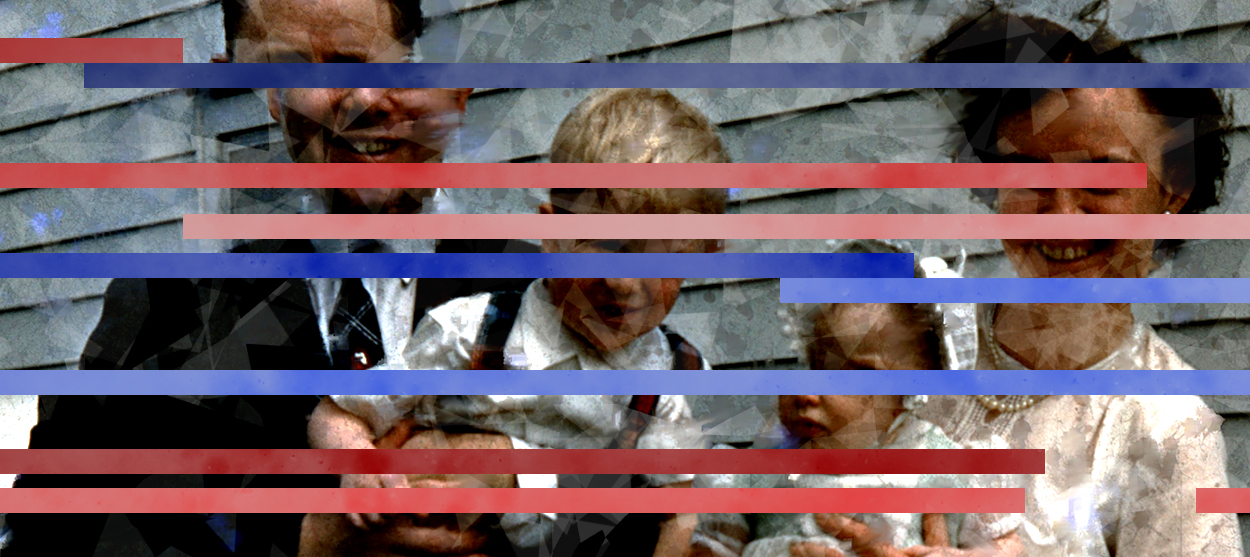Who destroyed the American family?
What conservatives and liberals can learn from each other about family values


A free daily email with the biggest news stories of the day – and the best features from TheWeek.com
You are now subscribed
Your newsletter sign-up was successful
Liberals don't hate families.
It shouldn't be necessary to say this, but it is, in light of the dire warnings that conservatives have been issuing for years about the liberal war on the family. Tune into talk radio, and you'll get an earful about progressive plots to undermine family togetherness. Even in the age of philandering, twice-divorced Trump, Republicans still take for granted that they are the party of family values.
It's only to be expected that liberals would resent this. After all, they marry and have families. They sniff sentimentally when the Christmas cards arrive. Yet in the eyes of conservatives, nothing will acquit liberals of the charge of being anti-family.
The Week
Escape your echo chamber. Get the facts behind the news, plus analysis from multiple perspectives.

Sign up for The Week's Free Newsletters
From our morning news briefing to a weekly Good News Newsletter, get the best of The Week delivered directly to your inbox.
From our morning news briefing to a weekly Good News Newsletter, get the best of The Week delivered directly to your inbox.
Once in awhile liberals get indignant enough to rant back. That's what happened last week, when New York Times columnist Thomas Edsall published a column on how "liberals do not want to destroy the family."
Edsall's polemic covers many familiar liberal talking points. He agrees that family breakdown is a serious problem in America today, but he sees it as primarily an economic problem that the left has long been anxious to fix. Surveying the political landscape, it also seems to Edsall that liberals are in fact more successful than conservatives at forming healthy families. Sociologists go to Trump country if they want to study family breakdown. Meanwhile, tony upper-middle-class progressives are marrying, buying adorable craftsman bungalows, and raising highly accomplished children. How can we accuse the latter group of being anti-family, even as the people of the heartland unite around a Playboy-posing serial adulterer?
The second half of the argument is the one that truly needs answering, but first it's worth appreciating the weakness of Edsall's economic point. Financial hardship is indeed bad for families, and conservatives have been slow to acknowledge it. But it alone doesn't adequately explain the dramatic rise in divorce and non-marital childbearing that America witnessed in the second half of the 20th century. As sociologist Brad Wilcox notes in response to Edsall's argument, these trends were already quite visible in the 1960s, well before de-industrialization started depriving the American heartland of secure jobs. Depression-era families were considerably more stable, though their economic situation was far more precarious. How do we explain this, if changing cultural norms were just a noisy sideshow?
We needn't paint liberals as saboteurs to plausibly argue that some of their cultural crusades have destabilized family life. A century ago, divorce and fornication were widely regarded as sinful, and out-of-wedlock births brought shame on young women and their parents. Both husbands and wives had a reasonably clear sense of what they were expected to do within the family. Liberals had reasons (some good, and others less so) for wanting to change these norms. The evidence strongly suggests, though, that the relaxation of traditional mores led to a significant decline in stable marriages and marital births.
A free daily email with the biggest news stories of the day – and the best features from TheWeek.com
This is why conservatives accuse liberals of "destroying the family." Liberals don't hate families as such, but they have made a concerted effort to undercut traditional norms that once brought stability to sex, marriage, and family life. Most of the time, this was done with an eye to rectifying injustices (for instance, to battered spouses), enhancing individual freedoms (especially for women), and boosting economic and technological growth. They weren't trying to create a world in which 40 percent of our children are born out of wedlock. That's what happened though, and after issuing warnings about this for decades, conservatives feel justified in concluding that liberals are to blame.
The collapse of red state families is a real problem, however. If the right is truly working to save the family, why are well-to-do Bostonians beating the citizens of Arkansas and Oklahoma in the game of matrimony? Conservatives seem to appreciate this is a problem for them, as they implicitly acknowledge when they excoriate their progressive brethren for "failing to preach what they practice." It's a curious critique that has become increasingly mainstream on the right as partisan demographics shift. Once conservatives condemned progressives for their libertinism, but now that progressives are looking increasingly disciplined, conservatives are reduced to complaining that liberals just aren't judgmental enough. Liberals own choices may be responsible, but they owe it to their less-fortunate compatriots to "protect the guardrails" by showering sexual malefactors with shame.
Does anyone find that argument plausible? Are we perhaps just looking here at the final, sour-grapes epilogue to Jerry Falwell's moral majoritarianism?
Don't count on it. Advantaged liberals have done a reasonably good job of constructing a family model that works for them and others of their class. The real question is: Can it work for anyone else? If not, then social conservatives will still be relevant to this discussion for many years to come.
Though liberals do like families, they've always been less comfortable than conservatives with the idea that family obligations might necessitate sacrifice. The data consistently suggest that conservatives see marriage as a higher life priority. They are likelier to be married, and to attach high importance to marriage as a social good. Since their views still tend to be rooted in traditional sexual morals, conservatives don't balk at the suggestion that marriage should take priority over individual ambitions or personal fulfillment. They often advise young adults to marry young, instead of waiting until multiple adult milestones have been achieved.
Liberals, for their part, have developed a model of marriage that doesn't lean so heavily on sexual morals and pre-set marital roles. So-called "capstone marriage" builds on pre-existing successes, pooling two resumes and incomes in preparation for family life. Once the children arrive, capstone couples pour immense energy into their upbringing. Resources amassed in early adulthood make it possible to give kids a wealth of advantages: quality childcare and education, top-notch medical care and diet, ample opportunities for enrichment. Parents tend to stay together when they are mutually absorbed in the demanding project of raising high-achieving children.
That works out well for the children of elites, but there's an obvious problem here. If marriage and family are built on a foundation of educational and professional achievement, what happens to the low achievers? It's understood that they won't get a corner office, but are they also to be denied a family? By tying their marital model to more conventional forms of success, liberals may unwittingly have undermined those goods that normally have been available to the ordinary Joe or Jane: wedding bells, baby booties, and the comfort of meaningful human bonds.
It's tempting to try to fix this by throwing money at the problem. If material comfort and financial security are the key, can't we just take steps to ensure that everyone enjoys those things? Build daycares, offer child allowances, and try to smooth the road so that people don't need to succeed at high levels in order to enjoy a comfortable family life. Some liberals have already made proposals along these lines, and some of their ideas may be good.
Before we get too enthused about this approach though, we should take a good, hard look at America's least-prosperous regions. They already have lots of subsidies. Though we've made some modest gains, we really don't have a great track record of helping everyone succeed.
Then there's the fact that some things in life are just hard. If you try to make them easy, you end up destroying the essential structure that made these things good in the first place. Marriage and family may well be like this. Subsidies and free day care won't make people into successful parents unless they're emotionally and morally prepared for hard work and sacrifice.
Both conservatives and liberals implicitly recognize this, but conservatives want to embrace this reality head-on, telling people from childhood that marriage is hard and that they need to prepare for it. Liberals prefer to go a more indirect route, urging people to prove themselves in other spheres, and offering marriage as a kind of reward once they've demonstrated their capacity to be responsible citizens. Both methods can work, but it may be that the conservative approach works for a larger number of people. It offers marriage itself as a worthy aspiration and challenge, even for people who are unlikely to succeed at high levels in other spheres.
Conservatives do themselves no favors by warning ominously about a liberal war on the family. But they have a point when they try to disentangle privilege from the comforts of kith and kin.
Rachel Lu is a writer based in Roseville, Minnesota. Her work has appeared in many publications, including National Review, The American Conservative, America Magazine, and The Federalist. She previously worked as an academic philosopher, and is a Robert Novak Journalism Fellow.
-
 Local elections 2026: where are they and who is expected to win?
Local elections 2026: where are they and who is expected to win?The Explainer Labour is braced for heavy losses and U-turn on postponing some council elections hasn’t helped the party’s prospects
-
 6 of the world’s most accessible destinations
6 of the world’s most accessible destinationsThe Week Recommends Experience all of Berlin, Singapore and Sydney
-
 How the FCC’s ‘equal time’ rule works
How the FCC’s ‘equal time’ rule worksIn the Spotlight The law is at the heart of the Colbert-CBS conflict
-
 The billionaires’ wealth tax: a catastrophe for California?
The billionaires’ wealth tax: a catastrophe for California?Talking Point Peter Thiel and Larry Page preparing to change state residency
-
 Bari Weiss’ ‘60 Minutes’ scandal is about more than one report
Bari Weiss’ ‘60 Minutes’ scandal is about more than one reportIN THE SPOTLIGHT By blocking an approved segment on a controversial prison holding US deportees in El Salvador, the editor-in-chief of CBS News has become the main story
-
 Has Zohran Mamdani shown the Democrats how to win again?
Has Zohran Mamdani shown the Democrats how to win again?Today’s Big Question New York City mayoral election touted as victory for left-wing populists but moderate centrist wins elsewhere present more complex path for Democratic Party
-
 Millions turn out for anti-Trump ‘No Kings’ rallies
Millions turn out for anti-Trump ‘No Kings’ ralliesSpeed Read An estimated 7 million people participated, 2 million more than at the first ‘No Kings’ protest in June
-
 Ghislaine Maxwell: angling for a Trump pardon
Ghislaine Maxwell: angling for a Trump pardonTalking Point Convicted sex trafficker's testimony could shed new light on president's links to Jeffrey Epstein
-
 The last words and final moments of 40 presidents
The last words and final moments of 40 presidentsThe Explainer Some are eloquent quotes worthy of the holders of the highest office in the nation, and others... aren't
-
 The JFK files: the truth at last?
The JFK files: the truth at last?In The Spotlight More than 64,000 previously classified documents relating the 1963 assassination of John F. Kennedy have been released by the Trump administration
-
 'Seriously, not literally': how should the world take Donald Trump?
'Seriously, not literally': how should the world take Donald Trump?Today's big question White House rhetoric and reality look likely to become increasingly blurred
